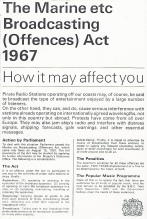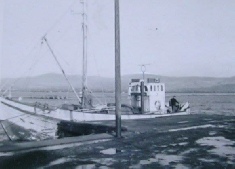© 2014-


Radio Caroline North - History (7)
Although financially necessary the directive from Philip Soloman (who was now effectively running the Caroline stations) to include these records in the station's output caused much resentment amongst DJs, particularly on Caroline South whose reception area contained hardly any audience for such material. Caroline North did at least have an audience in Ireland who appreciated the largely folk-
A number of dummy 'announcements' and 'advertisements' from British companies were also broadcast at this time in an attempt to confuse the authorities, who were known to be monitoring the station's output. These dummy commercials also provided cover for any true advertisers who, it was claimed, had bought £300,000 worth of airtime -
The fake advertisements which were broadcast included products from various large British companies such as Horlicks, Nestle and Beechams, who all strongly denied that they had bought airtime on the station in contravention of the Marine etc. Broadcasting (Offences) Act. Officially Radio Caroline denied that they were transmitting any free advertisements and claimed that contracts for these international products had been entered into quite legally before the Marine etc. Broadcasting (Offences) Act became effective.
Despite Radio Caroline's gesture of defiance in continuing to broadcast after the implementation of the Marine etc. Broadcasting (Offences) Act the authorities in Britain were determined to enforce the legislation and prevent any further stations taking to the air.
The Post O ffice placed advertisements in over 70 newspapers and magazines warning potential advertisers and suppliers of the provisions of the Marine etc. Broadcasting (Offences) Act and the penalties which could be imposed for contravening it. A full page advertisement was also taken in the American magazine Time in a bid to dissuade any foreign-
ffice placed advertisements in over 70 newspapers and magazines warning potential advertisers and suppliers of the provisions of the Marine etc. Broadcasting (Offences) Act and the penalties which could be imposed for contravening it. A full page advertisement was also taken in the American magazine Time in a bid to dissuade any foreign-
The initial euphoria which surrounded Radio Caroline's defiance of the Marine etc. Broadcasting (Offences) Act soon subsided as practical operating difficulties came to the fore. By September 1967 both ships were (theoretically at least) being tendered from foreign ports -
Programme material, and in particular new release records, also became more and more difficult to obtain and deliver to the ships so quite quickly the station had to dispense with its Top 50 chart, although it tried to maintain the illusion of a chart for some weeks after August 15th 1967.
Tenders visited the two Radio Caroline ships sporadically, often failing to bring essential items or sometimes even a replacement crew, a reflection of the difficulties of operating long distance supply routes. DJs spent many weeks at a time on board the two radio ships and the cumulative demoralising effect of this lifestyle came to be reflected in the station's programme output, dictated as it was largely by the Major Minor 'plug list'. Significantly neither those on board the ships, nor the station's listeners realised at this time that revenue earned from the constant playing of these 'plug list' records was not being used to pay Radio Caroline's bills.
essential items or sometimes even a replacement crew, a reflection of the difficulties of operating long distance supply routes. DJs spent many weeks at a time on board the two radio ships and the cumulative demoralising effect of this lifestyle came to be reflected in the station's programme output, dictated as it was largely by the Major Minor 'plug list'. Significantly neither those on board the ships, nor the station's listeners realised at this time that revenue earned from the constant playing of these 'plug list' records was not being used to pay Radio Caroline's bills.
However, despite this negative side to the continued operation of Radio Caroline some positive progress was achieved during the last two months of 1967. New DJs were clandestinely recruited to the station by Ronan O'Rahilly using his Mid Atlantic Films operation in London and Amsterdam as a 'front'.
Despite these clandestine recruitments and the facade of a foreign-
1968
As 1968 dawned both Radio Caroline stations were still on the air, each staffed by a small crew of DJs who had reluctantly become used to the hardships of an isolated life in the North Sea or Irish Sea. DJs frequently made on-
In spite of the low morale one positive programming achievement at this time was the reintroduction of a US Hot 100 chart with a regular supply of records having been arranged from across the Atlantic. However on the financial side Ronan O'Rahilly admitted for the first time that Radio Caroline's income was below expectations and the prospect of actually making a profit from the station's operations seemed remote -
After struggling to overcome all sorts of practical difficulties and hardships for six months to keep the Caroline stations on the air events took an unexpected and dramatic turn at the beginning of March 1968. During the afternoon of 2nd March a tug anchored a mile from the MV Caroline in Ramsey Bay, refusing to state its intended destination to the Isle of Man maritime authorities. The tug made no attempt to communicate either with the authorities or with the crew on board MV Caroline, who had themselves identified it as a Dutch vessel, but had no particular reason to suspect it was a threat to the radio ship.

‘Warning notice’ advertisement placed by the GPO
Click to enlarge

Click on picture to enlarge
Daily end of transmission announcement for Radio Caroline North International, Don Allen

Caroline North’s post August 1967 tender, Offshore 3, at Dundalk Harbour in Ireland.
Photo: Andy Cadier

History
Key Dates
Ship and Location
Technical
Staff
Programmes





Treasure Chest





Back to Britain Gallery


Back to Radio Caroline North
